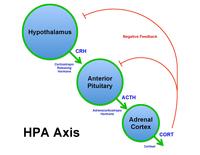
Photo from wikipedia
Four decades of research have focused on the relationship between acute stress and memory. A quick search on PsychINFO yields over 400 peer-reviewed articles on the topic. Although progress has… Click to show full abstract
Four decades of research have focused on the relationship between acute stress and memory. A quick search on PsychINFO yields over 400 peer-reviewed articles on the topic. Although progress has been made towards understanding the relationship between stress and memory, it remains a complicated topic. Research continues to work on understanding this important relationship, yet the public clamors for answers due to a wide range of possibilities for application. Educators are interested in capitalizing on potentially positive stress effects on learning and retention. The criminal justice system strives to improve interpretation of eyewitness reports by applying conclusions from the scientific community to jury instructions and general policy recommendations. However, with limited scientific consensus regarding the influence of stress on memory, these conclusions may be premature. The Editors of the Special Issue on Acute Stress, Memory and the Brain were motivated to highlight the complexity surrounding research focused on acute stress and memory. This Special Issue is both important and timely, as it follows on the heels of recent meta-analyses and general reviews (see, Gagnon & Wagner, 2016; Shields, Sazma, & Yonelinas, 2016). This Special Issue is geared towards focusing on how acute stress affects different process associated with declarative memory formation. Recent studies and reviews suggest that existing prominent models of stress and memory are unable to account for the complexity of reported findings in the literature. Critically, research suggests that no one theory is capable of accounting for the overall pattern of results (see Shields et al., 2016). The Editors of this Special Issue argue that there are three important factors that must be considered when developing a more comprehensive model to account for the cognitive and neurocognitive effects of stress on declarative memory. The Editors argue that full consideration of these factors, and how they may interact, will allow researchers to develop testable theoretical models for the relationship of acute stress and declarative memory.
Journal Title: Brain and Cognition
Year Published: 2019
Link to full text (if available)
Share on Social Media: Sign Up to like & get
recommendations!